Thank you for downloading this Atria Books eBook.
Join our mailing list and get updates on new releases, deals, bonus content and other great books from Atria Books and Simon & Schuster.
C LICK H ERE T O S IGN U P
or visit us online to sign up at
eBookNews.SimonandSchuster.com
We hope you enjoyed reading this Atria Books eBook.
Join our mailing list and get updates on new releases, deals, bonus content and other great books from Atria Books and Simon & Schuster.
C LICK H ERE T O S IGN U P
or visit us online to sign up at
eBookNews.SimonandSchuster.com
Praise for The Four Things That Matter Most
The Four Things That Matter Most provides simple, insightful words and stories that move the heart and the soul. Dr. Byock shows us a graceful way to nurture relationships and heal those that need mending.
Zorba Paster, M.D., author of The Longevity Code
Ira Byocks compassionate and important work in the field of dying has given him the four great treasures of love and freedom that all of us can use throughout our life. This wonderful book opens the doors to these jewels of compassion.
Joan Halifax, Ph.D., author of Being with Dying
O THER B OOKS BY I RA B YOCK, M.D.
Dying Well: The Prospect for Growth at the End of Life
The Best Care Possible: A Physicians Quest to Transform
Care Through the End of Life

A Division of Simon & Schuster, Inc.
1230 Avenue of the Americas
New York, NY 10020
www.SimonandSchuster.com
Copyright 2004, 2014 by Ira Byock, M.D.
All rights reserved, including the right to reproduce this book or portions thereof in any form whatsoever. For information, address Atria Books Subsidiary Rights Department, 1230 Avenue of the Americas, New York, NY 10020.
First Atria Books hardcover edition June 2014
ATRIA BOOKS and colophon are trademarks of Simon & Schuster, Inc.
The Simon & Schuster Speakers Bureau can bring authors to your live event. For more information or to book an event contact the Simon & Schuster Speakers Bureau at 1-866-248-3049 or visit our website at www.simonspeakers.com.
Interior design by Jaime Putorti
Jacket design by Janet Perr
Jacket background photograph by Shutterstock; photograph of compass by William Morris Photography
Author photograph by Geoff Sutton
Library of Congress Cataloging-in-Publication Data is available.
ISBN 978-1-4767-4853-5
ISBN 978-0-7432-5860-9 (ebook)
To my mother,
Ruth G. Byock (19222003), for giving me life and love, and teaching me what matters most.
And to my mothers-in-law, Anita Figueredo Doyle (19162010) and Grada Jansen Poirier (19222012), for helping to expand my heart and continuing to enrich my life.

IRA BYOCK, M.D., is a leading palliative care physician, author, and public advocate for improving care through the end of life. His research and writing have helped to define quality of life and quality of care for people living with advanced medical conditions. He has been involved in hospice and palliative care since 1978 and is a founding member and past president of the American Academy of Hospice and Palliative Medicine. From 1996 through 2006, he served as director for Promoting Excellence in End-of-Life Care, a national grant program of the Robert Wood Johnson Foundation.
Dr. Byock directed the palliative care program at Dartmouth-Hitchcock Medical Center in Lebanon, New Hampshire, from 2003 through July 2013. He is a professor of community and family medicine at the Geisel School of Medicine at Dartmouth. More information is available at www.IraByock.org.
More information is available at www.TheFourThings.org.
MEET THE AUTHORS, WATCH VIDEOS AND MORE AT
SimonandSchuster.com
authors.simonandschuster.com/Ira-Byock
 Facebook.com/AtriaBooks
Facebook.com/AtriaBooks
 @AtriaBooks
@AtriaBooks
Authors Note
This book is a work of nonfiction, but it is not intended to be reportage. The writing conveys my own experiences and those of people I have met through my clinical work or interviewed for this book.
Events from my clinical practice were written from memory, often supported by contemporaneous notes. In most instances, I have changed peoples names and identifying details. Some stories are composites drawn from two or more patients and families I have known. Here, too, I have tried to faithfully convey the essence of real experiences.
Contents
Introduction to the Tenth Anniversary Edition
Learning from Conversations with My Readers
There are few better ways to deepen ones understanding of a subject than to teach it. As a practicing physician and professor at a medical school, I am continually learning. Questions from patients or doctors-to-be frequently illuminate a problems complexities, allowing me to see the whys, hows, and what-ifs through fresh eyes.
Similarly, in the 10 years since The Four Things That Matter Most was first published, readers have taught me about the challenges people encounteror assume they will encounterin following my recommendations for mending, tending, and celebrating relationships. They also report benefits that I had not foreseen in saying the four things that matter most: Please forgive me. I forgive you. Thank you. I love you. People who have attended readings Ive given or called in to radio talk shows have asked questions about troubled relationships and situations that seemed to make saying the Four Things impossible. The people who have taught me the most were those who wrote or spoke to me of their doubts. They agreed they wanted to say the Four Things but had questions regarding whether these principles could work after theyd had so many painful experiences in their relationships. Often the situation they described involved a parent and, although this was hardly a scientific sample, most often that parent was a father.
Im grateful to each person for his or her willingness to ask me those hard questions and share sometimes excruciating details of their personal lives, and I admire their strength and determination in moving forward to say the Four Things. Our conversations have given me a fuller understanding of how saying the Four Things can positively affect peoples lives. Hopefully, I have become a better doctor and teacher as a result of their feedback. And hopefully their stories and the varied situations in which they benefited from saying the Four Things can help you better see how you can use the Four Things, too.
Why the Four Things Work
One winter morning, the week after The Four Things That Matter Most was published, I was sitting at home at my desk in New Hampshire being interviewed by phone for a news radio station in Philadelphia. One of the shows cohosts began the interview in a lighthearted way, asking, I liked your book a lot, Dr. Byock, but why would anyone buy it? After all, you give the books main message away in the first paragraph.
I laughed out loud. She had a point. Chapter 1 begins by explaining what the four things that matter most are. But the stories of real people that fill this book are necessary to convey the value of saying the Four Things and give you the full picture of how the Four Things can help and the contexts in which you can say them. I dont profess that if you just say these Four Things to someone, your relationship will be healed. Saying them will certainly help, but while they are the right words, you need to say them at the right time and place.
Next page
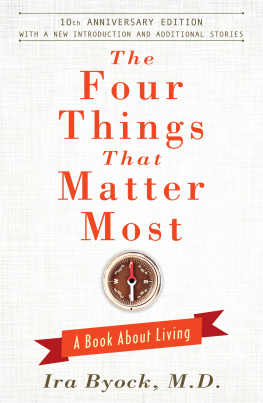


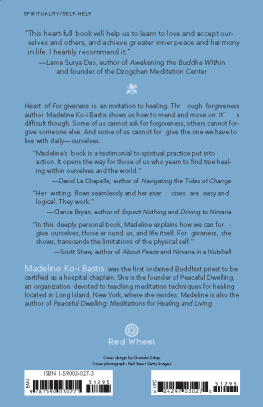
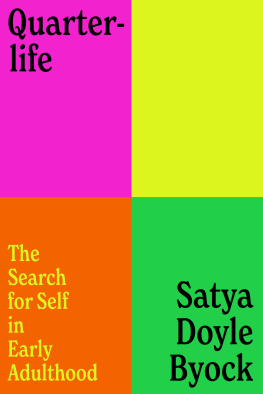

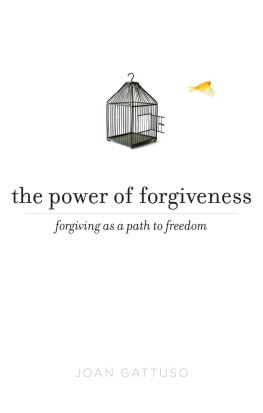

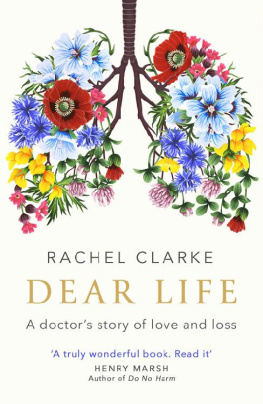





 Facebook.com/AtriaBooks
Facebook.com/AtriaBooks @AtriaBooks
@AtriaBooks